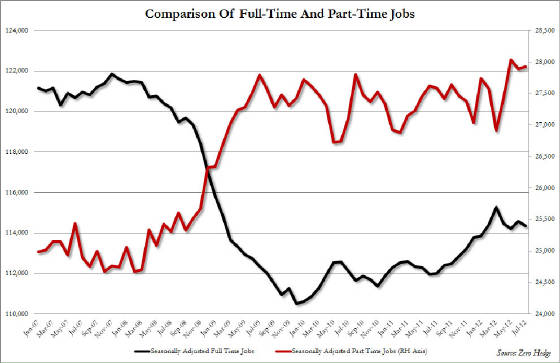
The New Normal: Part-Time Employment
James Hall
The Business Journal attempts to answer this question in, Zoom in on jobs: Is part-time work the new normal?
"One area worth a focus is that of part-time workers, especially those involuntarily working less than a full-time position. According to Table A-8 from last month's employment situation report, some eight million workers were involuntarily employed part-time due to economic reasons, including slack work or that they could only find part-time work.This notion of a new jobs paradigm, a new structure to the employment world, is not a ground-breaking concept but one worth revisiting; it'll resonate with readers, especially those earning their livings this way. Here's a Reuters video package that calls this trend "the new normal" for the labor market."
If you want to assess the beneficiaries of this adjustment in the livelihood workplace conditions, look no further than establishment spokespersons that defend the governmental push to drive down wages and marginalize jobs. Why a Part-Time Workforce Is the New Normal, quote unmasks the corporatists attitude that underpins the disposable nature of the "just in time" economy.

"Many employers are looking to make the employment relationship more flexible, and so are increasingly relying on part-time work and a variety of arrangements known as 'contingent work,'" said Federal Reserve Governor Sarah Bloom Raskin in a speech last month. "[It's] a sensible response to today's competitive marketplace…and allows firms to maximize workforce flexibility in the face of seasonal and cyclical forces."
"Operators can't be as casual about workers' total hours as they could before because there are fines and penalties and costs associated with it," Scott DeFife, executive vice president for policy and government affairs for the National Restaurant Association, told The New York Times. "You can't accidentally let them become full-time without a specific purpose."
"No one has collected detailed data on part-time workers at the nation's major retailers. However, the Bureau of Labor Statistics has found that the retail and wholesale sector, with a total of 18.6 million jobs, has cut a million full-time jobs since 2006, while adding more than 500,000 part-time jobs.
According to the Bureau of Labor Statistics, part-time workers in service jobs received average compensation of $10.92 an hour in June, which includes $8.90 in wages plus benefits of $2.02. Full-time workers in that sector averaged 57 percent more in total compensation - $17.18 an hour, made up of $12.25 in wages and $4.93 in benefits. Benefit costs are far lower for part-timers because, for example, just 21 percent of them are in employer-backed retirement plans, compared with 65 percent of full-timers."
1) The job market is seriously mediocre, there just isn't enough work for companies to increase people's hours to full-time, or for companies to finally offer a decent full-time job.
2) The Affordable Care Act (ACA) creates an incentive for employers to keep people part-time, or even drop them down to part-time hours, because the employers don't get penalized for not offering health insurance.
3) Employers just like having part-time workers: it gives them more flexibility, and it's cheaper. This would be a 'structural' change in the labor market . . .
4) Finally, part-time work is just one category of 'underemployed' or 'total unemployed.' There's also people who are available for work but have stopped looking because they don't think there's a job out there for them ('discouraged workers'). That number is also up in June, by 200,000.
"Recall that under Obamacare, the definition of full-time employment is 30 hours. The BLS cutoff is 34 hours. At 30 hours, companies gave to pay medical benefits so they have been slashing the number of hours people work. This reduced the number of hours people worked and provided an incentive for many to take on an extra job.
In the past month there was a surge of 679,000 in the number of people working multiple jobs. The seasonally-adjusted increase was 340,000."
It should be apparent from all these accounts and statistics that the future of long-term full time employment with benefits resides in the recesses of the past. The American Dream of a middle class life is dead. The youth are the biggest losers in this systematic destruction of the economy through the globalization and exporting of good jobs. The accelerated divide between government favorites and the expendable "hired help" has never been greater.
James Hall – July 10, 2013
